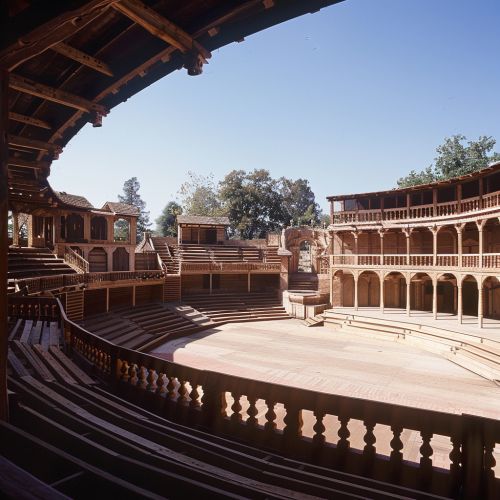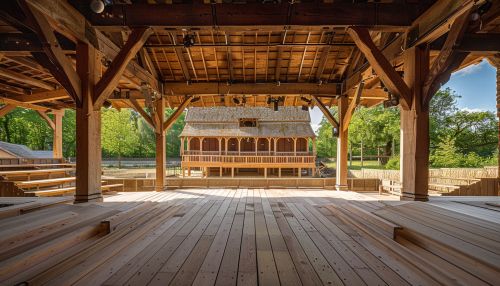Elizabethan theatre
Origins and Development
The Elizabethan era marked a golden age in English history, particularly in the realm of theatre. The Elizabethan theatre, also known as Early Modern English theatre, refers to the theatre of England between 1562 and 1642. This is the style of the plays of William Shakespeare, Christopher Marlowe, and Ben Jonson.
The establishment of large and profitable public theatres was an essential enabling factor in the success of English Renaissance drama. Once they were in operation, drama could become a fixed and permanent, rather than a transitory, phenomenon. The construction of permanent playhouses, such as The Theatre and the Rose, marked the beginning of a new era in English theatre.


Structure and Design of Theatres
Elizabethan theatres were quite different from today's theatre venues. They were generally open-air venues, which could accommodate a large audience. The design of these theatres was influenced by the Roman amphitheatre, but with modifications to suit the requirements of the plays and the English climate.
The stage was a raised platform, and the audience surrounded it on three sides. The back of the stage was used for entrances and exits and was also used to create a backstage area. The stage itself was bare, with minimal props and no scenery, putting the focus on the actors and the language of the play.
The Plays and Playwrights
The Elizabethan theatre saw the development of a wide range of plays, from comedies and tragedies to histories and romances. The plays often dealt with themes of love, power, and human nature, reflecting the concerns and interests of the Elizabethan audience.
The most famous playwright of the Elizabethan era is undoubtedly William Shakespeare. His plays, such as Romeo and Juliet, Hamlet, and Macbeth, are still performed and studied today. Other notable playwrights of the era include Christopher Marlowe, known for his play Doctor Faustus, and Ben Jonson, who wrote Volpone and The Alchemist.
Performance Practices
In the Elizabethan theatre, all roles, including female roles, were played by men. Boys, often from the choir of the Chapel Royal, played the female roles. The actors wore contemporary clothing, not historical costumes, and used props sparingly.
Performances were usually held in the afternoon, using natural light. Music and dance were integral parts of Elizabethan performances, and plays often included songs and elaborate dances.
Influence and Legacy
The Elizabethan theatre had a profound influence on later theatre practices. The focus on language, the use of a bare stage, and the convention of having the audience on three sides of the stage are all elements that have been incorporated into modern theatre.
The plays written during this period have had a lasting impact on literature and drama. Shakespeare's plays, in particular, have been translated into every major language and are performed more often than those of any other playwright.
